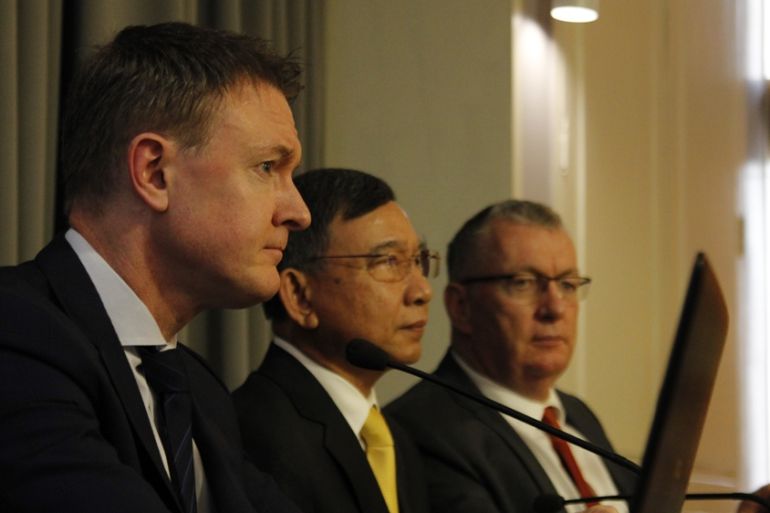Transnational crime boom a destabilising influence in SE Asia: UN
New report on how criminal groups rake in billions of dollars via drug trade, human trafficking and other activities.

Bangkok, Thailand – Transnational organised crime is expanding “aggressively” in Southeast Asia and beyond, according to a new United Nations report outlining how criminal networks have been raking in tens of billions of dollars annually through drugs, counterfeit goods, and human and wildlife trafficking, among other activities.
The study by the UN Office on Drugs and Crime (UNODC) on Thursday found that criminal syndicates have transformed the region’s drug trade, with the methamphetamine market now worth between $30bn and $61bn per year in East and Southeast Asia, Australia, New Zealand and Bangladesh.
Keep reading
list of 4 itemsPalestinian Prisoner’s Day: How many are still in Israeli detention?
‘Mama we’re dying’: Only able to hear her kids in Gaza in their final days
Europe pledges to boost aid to Sudan on unwelcome war anniversary
It also identified human smuggling as an issue of major concern, noting that the trafficking of women and girls for sexual exploitation “remains a serious problem” in most Southeast Asian and East Asian countries.
“Of the total number of victims trafficked for sexual exploitation, almost 70 per cent were underage girls,” the report said.
Although the research said law enforcement has had an effect on the routes used by the criminal groups, it also found that the syndicates simply boosted their efforts by shifting their attention towards less protected zones, including border areas with blind spots in terms of oversight and control.
Highlighting widely prevalent corruption, the report also said organised crime utilises private enterprises, such as the region’s multibillion-dollar casino operations, to launder money on a wide scale.
“Organised crime groups function like businesses, and the conditions to traffic drugs and human beings, and other commodities, have been good for growth and the bottom line,” UNODC’s Jeremy Douglas, regional representative for Southeast Asia and the Pacific, told Al Jazeera
He said that in order to counter organised crime, governments need to start putting in place serious and meaningful strategies that will address the severity of the problem.
“Part of the response is going to be policing and cross-border law enforcement cooperation to address supply, but it will also require a political push by the highest levels of government, and an investment in drug prevention, treatment, and [education of] social harms to address market growth and demand,” he said.
Drugs, human trafficking
The report, Transnational Organised Crime in Southeast Asia: Evolution, Growth and Impact, is the most comprehensive review of organised crime and related illicit activity in the region in more than five years.
It said the region’s illicit drug business has been growing particularly fast over the past few years, pointing to the “unprecedented” and “dangerous” expansion in production and trafficking of meth, coming largely from Myanmar.
Behind meth, heroin is the second most frequently trafficked drug in Southeast Asia, the report said, citing growing seizures within the region.
Overall, the total value of the regional heroin market ranges between an estimated $8.7bn-$10.3bn annually.
Separately, the report pointed out that migrant-trafficking networks in Southeast Asia and beyond are highly advanced and have little issue dodging law enforcement.
It said most human-trafficking victims are being brought to countries such as China, Malaysia and Thailand from places like Cambodia, Laos, Myanmar, the Philippines and Vietnam.
“Organized crime groups trafficking and smuggling people are exploiting differences in economic development and demand for cheap labour,” the report said.
‘Transnational solutions for transnational crimes’
Southeast Asia is also a major destination for supply chains of counterfeit goods.
The report cited the growth of e-commerce and advertising on social media, along with accessible manufacturing tech, as helping counterfeiters to organise and distribute illicit products more easily.
“The fact is, the conditions on the ground favour production to take place,” Douglas said.
Corruption among government officials is also exacerbating the situation, while a lack of accountability and inadequate criminal justice responses have played a role in aiding migration-related crimes across the region, the report outlined.
“Transnational organised crime is an increasingly destabilising influence in Southeast Asia and a direct challenge to the 2030 Agenda and Sustainable Development Goals embraced by the region, and it is time for a rethink of the strategy to address it,” the report concluded.
Douglas repeatedly recommended that, now more than ever, governments need to work together to tackle the complexity of organised crime in the region, adding that it’s only possible through a concerted global effort.
“We need to have transnational solutions for transnational crimes,” he said, with a sense of urgency.